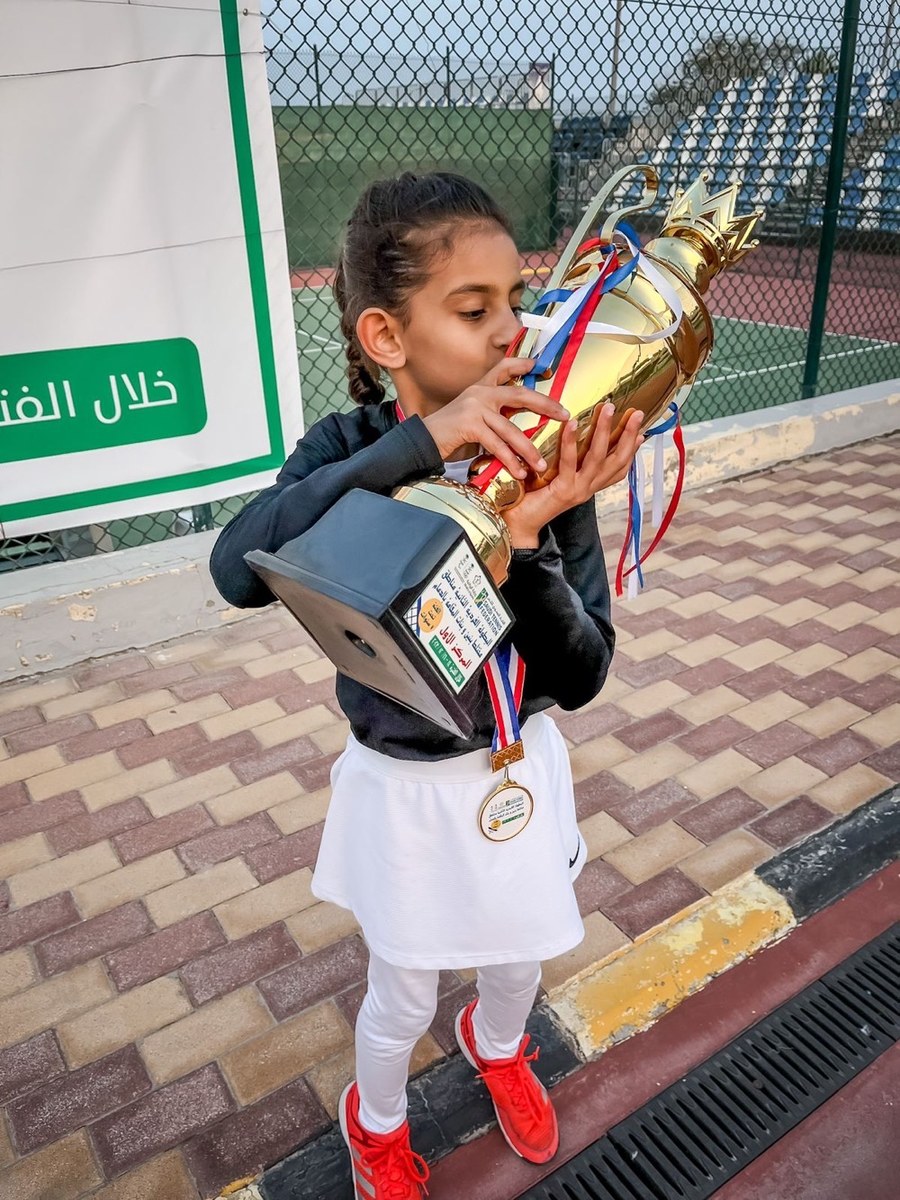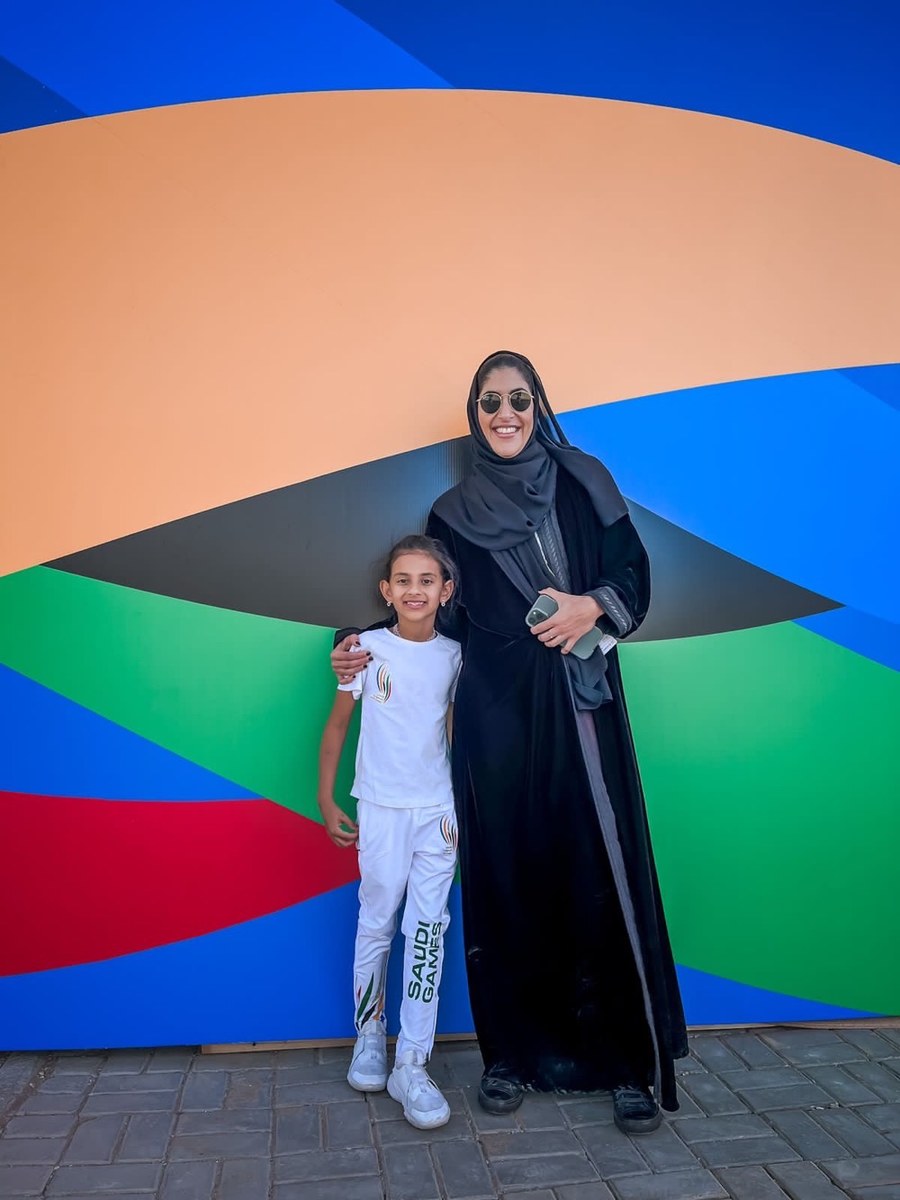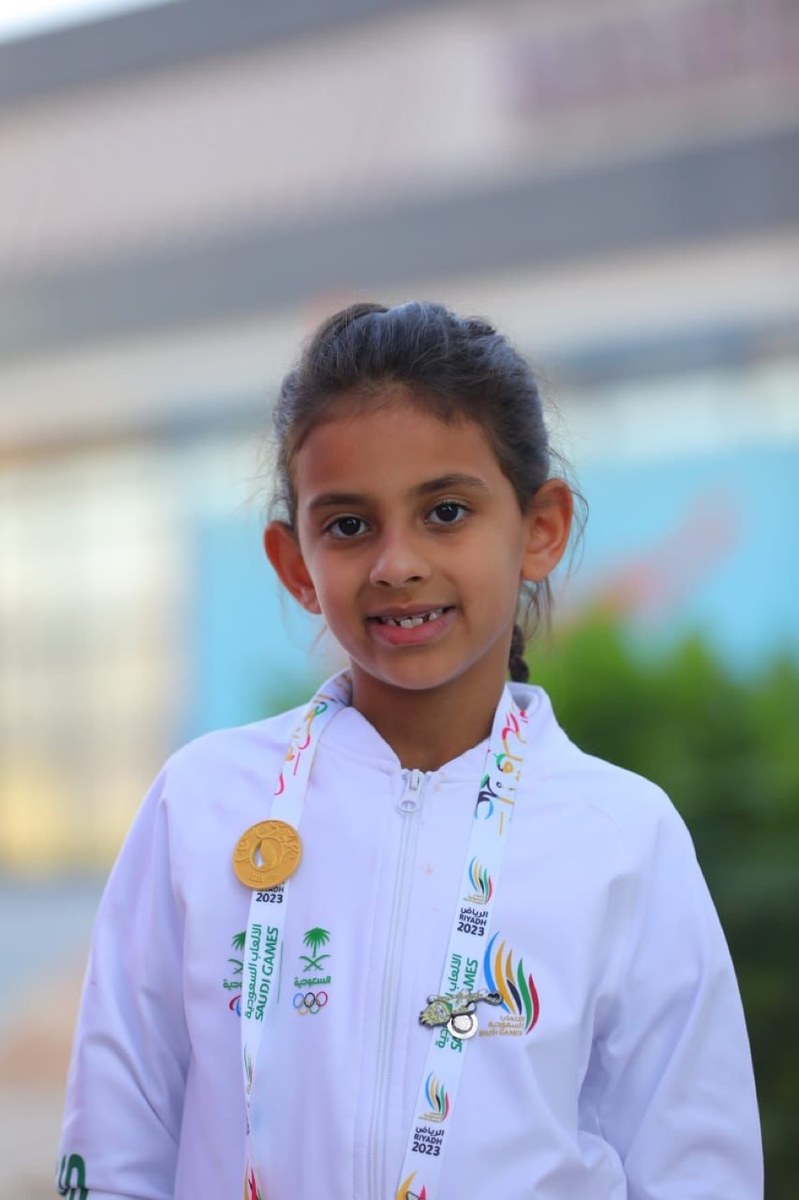DHAHRAN: The first thing you notice about Dhahran’s Sama Al-Bakr is her lean physique, dimpled smile, focused gaze, and long dark hair, neatly tied by her mother in a variation of a braid, her signature hairstyle.
At age 7, Sama is already a tennis pioneer in Saudi Arabia. With a cabinet full of trophies, all won during the last year or so, she is considered a local champion.
Her father, Ali, is never far behind her. Protective, yet patient, he is there to help strike a balance, fostering Sama’s talent, while keeping her on track. He encourages her to train hard, but also savor the journey.
The sound of a tennis ball bouncing off a wall is a constant in the Al-Bakr household. And that echo goes well beyond their home — Sama is always down for a tennis match or anything tennis-related.
Before practice one morning, Sama was seen by Arab News intently dipping freshly baked cookies into a cup of hot chocolate. The sweet goodness seemed to fuel her and give her joy.
But nothing made her eyes light up quite like discussing her favorite sport. “I like tennis; it’s so fun to play,” Sama, whose name translates to “sky” in Arabic, told Arab News.

About four years ago, the Al-Bakr family’s tennis journey began with a tennis racket that belonged to Sama’s father. It was a gift from his own father, who never played tennis, and had remained untouched for years until Al-Bakr decided to give it a spin during the pandemic.
He decided to learn to play tennis as a way of keeping active during the COVID-19 lockdown, but had no idea that the unused racket would open the door to a tennis-centric family adventure.
“Dad, what is that?” Sama asked him when she saw the racket. “It’s for tennis — do you want to try?” he replied.
After learning the basic rules, they cleared the furniture out of their living room, making space for their new-found tennis dreams. He told her to try hitting the tennis ball on the wall to see what would happen.
Tennis soon became Sama’s favorite hobby, and the room her sanctuary. Even today, nobody is allowed in that room but Sama. It is where she goes to relax after a long day studying in the second grade.
“When she comes home, when something has happened, you’ll hear it,” her father joked. “You will hear the bang, bang! Nobody touches the place. It’s for Sama. She still practices there; it is still her place now.”
Sama’s 12-year-old sister had dabbled with tennis before deciding to pursue other interests. Sama’s interest never faltered, however — it is tennis, tennis, tennis, all the time. She remains focused and excited about the game, and runs out gleefully when her favorite coach — hired by her father — is ready to give her a lesson.
“I’m learning with her. I’m watching YouTube, I’m looking things up online as we go,” her father said.
He no longer has time to play on his own, as all of his playing energy is focused on helping to improve Sama’s game. In his spare time, he researches the best coaches for her age group, even if they are in the Czech Republic, and tries to study the best practice routines.

Sama with Princess Delayel bint Nahar Al-Saud, the deputy director of the Saudi Games. (Supplied)
Since they have access, Sama also trains in Aramco facilities; the camp has a long history of incorporating tennis as part of the Aramco subculture. They have a tennis court for children where Sama mixes with other players her age. She trains with a coach four days a week and has gone through several coaches to find the right one.
Aside from wanting to play at Wimbledon one day, she enjoys competing in Saudi Arabia.
Princess Delayel bint Nahar Al-Saud, deputy director of the Saudi Games, is one of Sama’s most vocal supporters. At the recent Saudi Games in Riyadh, Princess Delayel posted a photo with Sama on X.
On Dec. 4, she wrote a caption beside their smiling faces: “So proud of our rising tennis star Sama Al-Bakr … who will raise the Saudi flag tomorrow at the opening of the tennis tournament as our youngest participant ever at the age of 7.”
The Saudi Games, which brought together more than 6,000 athletes from 50 different sports in a national celebration late last year, was a chance for the young athlete to mingle with other star athletes in the country.
“Sports is an important and evolving part of what it is to be Saudi. We take pride in our athletes and their successes,” Princess Delayel told Arab News in November.
“At this year’s Saudi Games, we will not only celebrate the winners, but we will also celebrate every participant and, as a nation, we will celebrate ourselves.”
As an aspiring athlete in her youth, Princess Delayel had felt the limitations in the Kingdom first-hand while pursuing competitive equestrian show jumping.
She took Sama under her wing at the Saudi Games, but their correspondence did not stop when the games ended. They now occasionally exchange voice notes over WhatsApp, and the boost helps Sama’s confidence to keep going.
Many of the Kingdom’s best players have competed in Bahrain, a short drive via the King Fahd Causeway. Another Saudi tennis player, Yara Al-Hogbani, 19, is famously the first Saudi woman to turn professional and has been registered at the Al-Ittihad Club since 2018.
“Everybody, look out for this little one. She’s the future of Saudi tennis,” Al-Hogbani wrote on her Instagram account recently, tagging Sama.
Her family plans to let Sama turn pro “unless something else happens,” her father said.
He likes to keep his daughter’s options open, and does not want her plagued with pressure or to lose her passion for the sport. As long as she loves tennis, they will pursue it seriously, and play tournaments and train. He promises that on the day Sama decides it is not fun anymore, they will stop.

“Now what makes ‘champions’ different? They have the right setup. We have seen a lot of blessings in the past few months,” he proudly said of his daughter.
While recognition in the Kingdom’s capital and in Bahrain is appreciated, what the family wants most is for their hometown of Dhahran to be the next fertile field for Sama and other young stars of the future.
Speaking about what he envisions for the future of Saudi athletes, her father said: “I want everyone to have a role model. Sama can be that for them.”
Sama is enrolled at Dhahran Ahliyya School, one of the leading private schools in the Eastern Province, which began prioritizing physical education and a healthy lifestyle for girls well before it was encouraged by Vision 2030. The school does not have tennis as part of its physical education curriculum, but students are encouraged to play basketball and soccer.
“People in Saudi Arabia are interested in tennis; they love this game and love this sport. And maybe we should focus on it. It shouldn’t only be central to Riyadh, Sama is here in Sharqiya … we want Sharqiya to be proud of her,” her father said.
He also hopes Sama’s school will introduce tennis so girls can enjoy the sport.
When Arab News asked Sama who she would like to ideally play with in the future, her father began mentioning a few decorated tennis players’ names. She nodded or shook her head as he listed them, but eventually sweetly tilted her head and said: “I like to play with Baba.”























